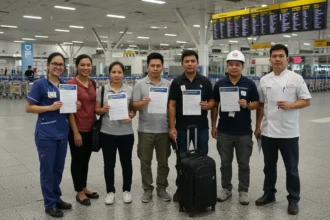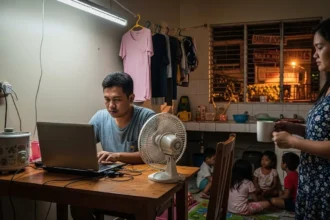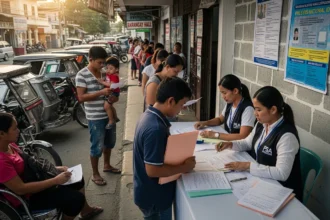The question haunts every coffee break, every LinkedIn post, every late-night scroll on Facebook: “Papalitan na ba tayo ng AI?”
- ⚙️ What AI Can (and Can’t) Do: The Reality of Automation in the Philippines
- 💼 The Filipino Jobs Most (and Least) at Risk from AI
- 🧠 How Filipinos Can Future-Proof Their Careers in the Age of AI
- 🚀 The Future of Filipino Work: Collaboration, Not Competition
- 💬 FAQs About AI and the Future of Filipino Jobs
- 💙 The Filipino Worker Will Always Adapt
- 🧭 References
Ever since ChatGPT, Midjourney, and all those smart-sounding bots entered the scene, many Filipinos – especially those in BPOs, content creation, and freelancing – started to wonder if technology is slowly making us obsolete. One viral meme even joked: “AI works 24/7, doesn’t take lunch breaks, and doesn’t ask for 13th-month pay.” Funny… but also scary, right?
The truth is, yes – AI is changing jobs fast.
But no – it won’t replace the Filipino worker entirely.
Why? Because the Filipino workforce has something AI doesn’t: heart, empathy, creativity, and cultural intuition. Our jobs may evolve, but our value doesn’t disappear – it transforms.
This isn’t a story about replacement. It’s a story about reinvention.
So before you panic about losing your job to a robot, let’s look at the bigger picture – how AI is reshaping the Filipino workplace, and how we can stay one step ahead.
⚙️ What AI Can (and Can’t) Do: The Reality of Automation in the Philippines
When people hear “AI,” they imagine robots stealing jobs – typing faster, thinking smarter, never sleeping. But in reality, AI isn’t replacing humans; it’s replacing tasks. And that’s a big difference.
Artificial Intelligence thrives on repetition, data, and pattern – things that can be measured and automated. What it can’t do well (at least not yet) are the human things – empathy, judgment, and creativity that come naturally to Filipinos.
Let’s break it down.
💻 1. In BPO and Customer Support
The Business Process Outsourcing (BPO) industry is one of the biggest employers in the country – over 1.7 million Filipinos. So when AI chatbots and voice assistants arrived, many feared the worst.
And yes, some basic tasks are now automated:
- Simple inquiries (like billing, passwords, tracking numbers)
- Repetitive data entry and call routing
- Chat-based customer service using AI scripts
But here’s what many don’t realize – AI still needs humans behind it.
Filipino agents now handle complex and emotional cases that bots can’t solve: complaints, negotiations, and empathy-based resolutions. In fact, many global companies are shifting from “call center agents” to “AI-assisted customer specialists.”
Instead of being replaced, Pinoys are being retrained.
The skill set is changing – less script, more strategy.
🎨 2. In Creative and Marketing Fields
Writers, designers, and editors are also feeling the AI wave.
Tools like ChatGPT, Canva AI, and Midjourney can now generate content in seconds. Some freelancers admit they use them for drafts and inspiration – but even then, AI has limits.
Try asking a bot to write a Filipino Mother’s Day caption or a tagline that sounds “maarte pero heartfelt.” You’ll see it fall flat every time.
Why? Because AI has logic, not hugot.
Brands still rely on Filipino creatives for tone, humor, and cultural nuance – things that algorithms can’t fully mimic.
So instead of fighting AI, creatives are learning to collaborate with it:
- Using AI to brainstorm ideas
- Automating repetitive design tasks
- Focusing more on storytelling and authenticity
It’s not the end of creativity – it’s just a new kind of creativity.
💼 3. In Freelancing and Remote Work
For freelancers, AI can feel like both a blessing and a threat.
On one hand, tools like Jasper, Notion AI, and Copy.ai help speed up writing, research, and project management. On the other hand, clients are starting to expect “AI-enhanced output” for the same pay.
But here’s the twist – the demand for Filipino freelancers hasn’t dropped. It’s actually rising.
Why? Because AI still needs a human filter. Clients need someone who can prompt, edit, localize, and fact-check AI-generated work – and that’s where Filipino freelancers shine.
We’re now seeing the rise of “AI-fluent” freelancers – those who combine digital literacy with Filipino work ethic and emotional intelligence.
In short, the smartest freelancers aren’t competing against AI – they’re using it to double their productivity and income.
🧠 4. The Human Advantage
So no, AI won’t wipe out Filipino jobs – but it will wipe out outdated skills.
The future belongs to those who can adapt, learn fast, and use tools smartly.
Because while AI can compute, it can’t care.
It doesn’t understand laughter, sarcasm, or pasensya. It can’t lead teams or comfort an angry customer who just wants to be heard.
And that’s where Filipinos will always win – sa puso, sa pakiramdam, sa diskarte.
💼 The Filipino Jobs Most (and Least) at Risk from AI
Let’s be honest – when people hear “AI will replace jobs,” the first thing they think is: “Ay, baka ako na susunod.”
But before the panic sets in, it helps to understand which jobs are actually at risk – and which ones are more future-proof.
AI doesn’t replace people – it replaces patterns.
So the more repetitive a task is, the easier it is to automate. The more emotional or strategic a job is, the harder it is for AI to copy.
Here’s what that looks like in the Filipino workforce today 👇
☎️ 1. At Risk: Routine BPO and Data Entry Roles
These are jobs that deal with clear, repetitive tasks – customer service scripts, email sorting, transcription, and ticket logging.
AI tools like chatbots and speech recognition software are already handling a big chunk of these responsibilities. But don’t lose hope – BPO companies are evolving too.
New roles are emerging:
- AI-assisted customer specialists
- Data trainers (people who teach AI how to respond properly)
- Quality assurance leads for bot-human collaboration
If you’re in BPO, this is your cue to upskill – focus on communication, conflict resolution, and emotional intelligence. Those are still 100% human territory.
🎨 2. Transforming: Content Creation and Design Jobs
Writers, graphic artists, and editors are learning to work with AI instead of fearing it.
Canva’s Magic Write, ChatGPT, and image generators can now do drafts and templates – but they still rely on humans for tone, context, and emotion.
For example:
AI can design a layout, but it can’t feel what looks “Filipino.”
AI can write a slogan, but it can’t sense what makes it funny or heartfelt.
So the Filipino creative’s edge remains – authenticity. If you can combine storytelling with tech fluency, you’ll not only survive… you’ll lead.
🧮 3. Evolving: Accounting, Admin, and Back-Office Work
AI is great at numbers, but not nuance.
Automation tools can now handle spreadsheets, invoices, and HR databases. But interpreting trends, handling exceptions, and dealing with people still require humans.
That’s why companies are shifting admin workers into analytics and coordination roles – less encoding, more decision-making.
If you’re in this field, start learning data literacy – how to read patterns, not just record them. It’s the difference between doing work and directing it.
🧑🏫 4. Adapting: Education and Training
AI tutors and e-learning platforms are rising fast, especially post-pandemic. But Filipino teachers have something algorithms lack: compassion.
Students need guidance, not just information.
The future teacher isn’t a lecturer – they’re a facilitator of human learning.
Educators who embrace AI tools (like personalized modules, automatic quizzes, and visual aids) will actually save time and focus more on mentoring and creativity.
In short: AI can’t replace the teacher’s heart.
🩺 5. Safe (and Growing): Healthcare, Social Work, and Skilled Trades
If your job involves empathy, touch, or care – you’re in the safest zone.
No machine can comfort a patient, read emotional cues, or handle unpredictable human behavior.
Filipino nurses, caregivers, therapists, and skilled workers (like electricians and mechanics) will remain in high demand globally. Even as AI enters healthcare, it will assist – not replace – human care.
💡 The Bottom Line
AI is here to stay – but so are we.
It’s not the “end” of Filipino work; it’s the evolution of it.
Those who adapt will find new opportunities. Those who resist change will feel left behind.
But the good news? We’ve been adapting all our lives – from OFWs learning foreign systems to freelancers mastering new tools overnight.
If anyone can survive the AI revolution, it’s the Filipino worker – creative, resilient, and always ready to learn, laugh, and keep going.
🧠 How Filipinos Can Future-Proof Their Careers in the Age of AI
We can’t stop AI – but we can stay ahead of it.
Instead of fearing the bots, we can learn to work smarter, not harder. Because the truth is, technology isn’t here to replace us – it’s here to remind us that growth never stops.
If there’s one thing Filipinos are good at, it’s learning new tricks in tough times. From tricycle drivers using GCash, to lolo farmers livestreaming their harvests – we always find a way. So here’s how we can future-proof our careers in this age of automation.
📚 1. Upskill Like Your Career Depends on It (Because It Does)
Gone are the days when one diploma was enough.
Now, every career needs a maintenance check.
Start learning new tools – even the ones that sound intimidating:
- ChatGPT, Midjourney, Canva AI, or Notion AI if you’re in creative or marketing fields.
- Excel, Power BI, or SQL if you’re in admin, finance, or analytics.
- AI writing or coding basics if you’re freelancing or managing digital work.
You don’t need to become a tech genius – just tech-confident.
The goal is to make AI your assistant, not your replacement.
(Pro tip: Start with free courses from Coursera, Google Digital Garage, or TESDA Online Program.)
💬 2. Double Down on What Makes You Human
AI can simulate emotion, but it can’t feel it.
That’s where Filipinos shine – empathy, humor, warmth, and “pakikisama.”
So even in tech-driven workplaces, these human skills will always matter:
- Communication: speaking with clarity and compassion
- Teamwork: collaborating across time zones and cultures
- Leadership: guiding others through change
- Critical Thinking: asking the right questions, not just following scripts
In short – let the bots automate; we’ll relate. ❤️
🌐 3. Build Your Digital Presence
Online is the new résumé.
Whether you’re a designer, writer, or teacher, employers now check your LinkedIn, Behance, or portfolio site before your CV.
Create a digital footprint that proves you can thrive in modern workspaces:
- Share your projects or side hustles.
- Showcase your learning journey (certificates, personal reflections).
- Network with people in your industry – or abroad.
Remember: the internet can replace your old boss with a new opportunity – but only if it can find you.
🧩 4. Mix Human Skill With Tech Skill
The best workers of the AI era are hybrids – people who blend soft skills with digital fluency.
Imagine these new job titles popping up fast:
- AI Content Editor
- Chatbot Specialist
- Prompt Engineer
- Digital Workflow Manager
- AI Literacy Trainer
These jobs didn’t exist five years ago – but they’re hiring now. The message is clear: don’t fear the future, fit into it.
💡 5. Stay Curious and Keep Evolving
The biggest threat to your career isn’t AI – it’s complacency.
The moment you stop learning, you start falling behind.
So make curiosity your habit: watch tutorials, read newsletters, join webinars, or even follow tech pages on TikTok (yes, legit learning happens there).
As the saying goes: “The tools will keep changing – but the winners are the ones who keep adapting.”
Filipinos have survived globalization, automation, and pandemics – all while smiling through it. AI? It’s just another challenge in a long list of things we’ve already turned into opportunity.
🚀 The Future of Filipino Work: Collaboration, Not Competition
Maybe we’ve been asking the wrong question all along.
It’s not “Will AI replace us?” – it’s “How can we work with it?”
Because the truth is, AI isn’t the enemy. It’s just the next evolution of the tools we’ve always used. Remember when people thought the internet would kill libraries? Or when freelancers were told remote work wouldn’t last? Look at us now.
Every generation faces a turning point – and this one is ours.
🤝 The Human + AI Partnership
In the future, the best workers won’t be human or machine – they’ll be human + machine.
AI will handle the repetitive stuff – data entry, scheduling, transcription – while Filipinos handle the human side: creativity, strategy, relationships, and empathy.
Imagine this:
- A BPO agent using AI to summarize customer histories instantly before a call.
- A content creator using ChatGPT to brainstorm, then adding their own Filipino flavor and humor.
- A teacher using AI tools to design lessons, freeing up time to focus on each student.
That’s not replacement – that’s amplification.
🌍 The Global Filipino Advantage
The world already loves working with Filipinos – we’re adaptable, English-fluent, and emotionally intelligent. Now imagine combining that with AI mastery.
The result? The most future-ready workforce in Southeast Asia.
BPOs will evolve into AI-powered service hubs. Freelancers will scale faster using smart tools. Even small business owners can use AI to market, automate, and compete globally.
Filipinos have always been global workers – now, we’ll be global innovators.
❤️ The New Kind of Work Ethic
In a world full of machines, the most valuable thing left is the human touch.
Our laughter, empathy, and creativity – those can’t be coded.
So the future of Filipino work isn’t about keeping up with robots. It’s about keeping our human core strong.
We don’t have to outthink AI. We just have to out-feel it, out-care it, and outlast it.
Because the Filipino spirit has always been adaptive.
We learned, we endured, we improvised – and we thrived.
AI might change the tools we use, but never the way we work:
with heart, with hope, and with humor.
💬 FAQs About AI and the Future of Filipino Jobs
1. Will AI really replace Filipino workers?
Not entirely. AI will automate repetitive tasks, but most Filipino jobs need human empathy, creativity, and decision-making – things machines can’t replicate. Some roles will change or evolve, but that’s not the same as total replacement. The key is adapting early and learning to work with AI, not against it.
2. What jobs in the Philippines are most at risk of AI automation?
Jobs that rely heavily on routine and repetition are the most vulnerable – data entry, transcription, basic BPO chat support, and certain clerical roles. But even in those fields, new opportunities are opening for people who can manage or train AI systems. The more analytical or creative your job is, the safer you are.
3. Which Filipino jobs are safe or even growing because of AI?
Anything that requires empathy, strategy, or cultural understanding will remain in demand. That includes healthcare, education, creative industries, management, and customer relations. AI can’t comfort a patient, mentor a student, or tell a story that makes people cry – only humans can. Those who combine tech skill with heart will thrive the most.
4. How can Filipino workers prepare for the AI era?
Start upskilling. Learn new tools like ChatGPT, Canva AI, and Google Workspace automations. Attend free courses online (TESDA, Coursera, or Google Digital Garage) to stay relevant. And practice adaptability – the willingness to learn, unlearn, and relearn. Because in the AI era, curiosity is the new job security.
5. What new careers are emerging because of AI?
New roles like prompt engineers, AI content editors, data curators, and automation managers are already growing. Even traditional fields like teaching, marketing, and customer service now have “AI-assisted” versions. The future will favor hybrid workers – people who understand both humans and machines.
6. Can freelancers in the Philippines use AI to their advantage?
Absolutely! Many Filipino freelancers now use AI tools to speed up writing, graphic design, and research tasks. That means more projects done in less time – and more income. The trick is using AI as an assistant, not a shortcut – you still need your creativity, accuracy, and personality to stand out.
7. How will AI affect the BPO industry in the Philippines?
AI is transforming BPO, but not killing it. Companies are shifting from simple customer service to AI-powered service solutions – where human agents use AI for faster responses and smarter problem-solving. It’s less about answering calls and more about managing systems. That’s why training and tech adaptation are crucial right now.
8. Do I need a tech background to survive in the AI era?
No, but you do need to be tech-comfortable.
You don’t have to code – just understand how to use AI tools, apps, and digital platforms. The best way to learn is by experimenting – use free versions of AI tools for your daily tasks. The goal is to work smarter, not harder.
9. How can AI help improve productivity for Filipino employees?
AI can automate routine reports, email summaries, scheduling, and research – freeing up time for more meaningful work. It can even assist with translations, presentations, or writing drafts. For Filipinos balancing multiple tasks, AI can be a quiet partner that saves time and energy – not a competitor.
10. What’s the best mindset for Filipinos facing the AI revolution?
Stay curious, flexible, and hopeful.
AI isn’t the end of work – it’s the start of a new kind of work. The most successful Filipinos will be those who keep learning and stay human in a world that’s becoming automated. Remember: robots might be fast, but no one beats the Filipino when it comes to heart, creativity, and diskarte.
💙 The Filipino Worker Will Always Adapt
Maybe AI will change the way we work – but it will never change why we work.
We show up not just for deadlines, but for dreams. For our families, for our kids’ tuition, for that quiet pride of being able to say, “Ako ang bumubuhay sa bahay na ‘to.”
And if there’s one thing history keeps proving, it’s that Filipinos always adapt.
We’ve faced automation before – from typewriters to computers, from landlines to smartphones – and every time, we learned, adjusted, and thrived.
So yes, AI will keep evolving. But so will we.
Because while machines can mimic skills, they can’t copy spirit.
Filipinos have grit, humor, and heart – the kind that no algorithm can calculate.
We’ll learn to use AI, shape it, even outsmart it – but never lose what makes us human.
And that’s something the future will always need.
🧭 References
-
DOLE ILS – Impact of AI on the Labor Market
-
SJ&P Wealth Advisory – Impact of AI on Employment & Economic Growth
-
RS Online – Robotics & Automation in Philippine Industry










